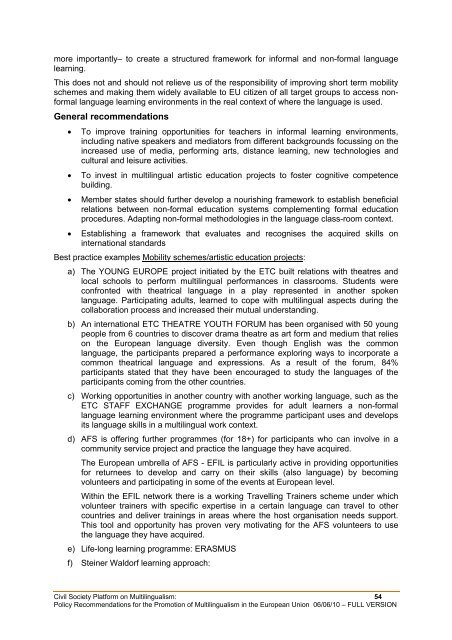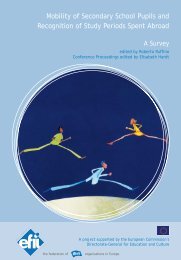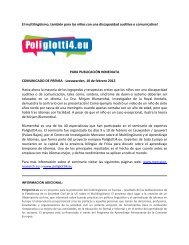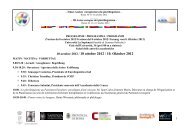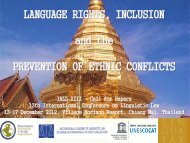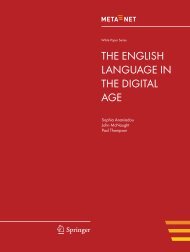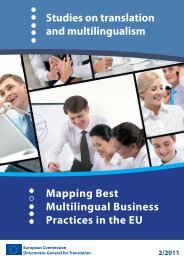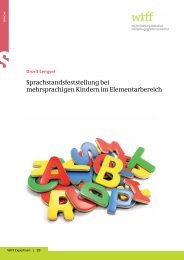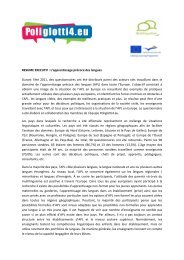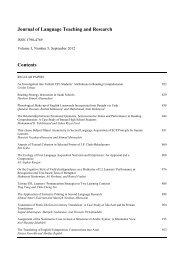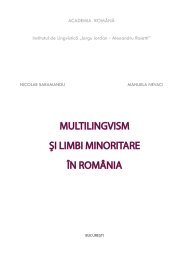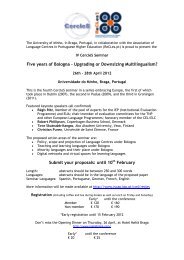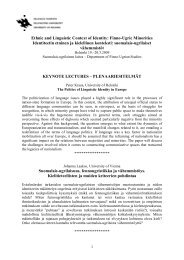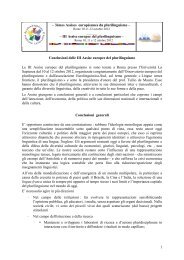more importantly– to create a structured framework for informal and non-formal languagelearning.This does not and should not relieve us of the responsibility of improving short term mobilityschemes and making them widely available to EU citizen of all target groups to access nonformallanguage learning environments in the real context of where the language is used.General recommendations To improve training opportunities for teachers in informal learning environments,including native speakers and mediators from different backgrounds focussing on theincreased use of media, performing arts, distance learning, new technologies andcultural and leisure activities. To invest in multilingual artistic education projects to foster cognitive competencebuilding.Member states should further develop a nourishing framework to establish beneficialrelations between non-formal education systems complementing formal educationprocedures. Adapting non-formal methodologies in the language class-room context. Establishing a framework that evaluates and recognises the acquired skills oninternational standardsBest practice examples Mobility schemes/artistic education projects:a) The YOUNG EUROPE project initiated by the ETC built relations with theatres andlocal schools to perform multilingual performances in classrooms. Students wereconfronted with theatrical language in a play represented in another spokenlanguage. Participating adults, learned to cope with multilingual aspects during thecollaboration process and increased their mutual understanding.b) An international ETC THEATRE YOUTH FORUM has been organised with 50 youngpeople from 6 countries to discover drama theatre as art form and medium that relieson the <strong>European</strong> language diversity. Even though English was the commonlanguage, the participants prepared a performance exploring ways to incorporate acommon theatrical language and expressions. As a result of the forum, 84%participants stated that they have been encouraged to study the languages of theparticipants coming from the other countries.c) Working opportunities in another country with another working language, such as theETC STAFF EXCHANGE programme provides for adult learners a non-formallanguage learning environment where the programme participant uses and developsits language skills in a multilingual work context.d) AFS is offering further programmes (for 18+) for participants who can involve in acommunity service project and practice the language they have acquired.The <strong>European</strong> umbrella of AFS - EFIL is particularly active in providing opportunitiesfor returnees to develop and carry on their skills (also language) by becomingvolunteers and participating in some of the events at <strong>European</strong> level.Within the EFIL network there is a working Travelling Trainers scheme under whichvolunteer trainers with specific expertise in a certain language can travel to othercountries and deliver trainings in areas where the host organisation needs support.This tool and opportunity has proven very motivating for the AFS volunteers to usethe language they have acquired.e) Life-long learning programme: ERASMUSf) Steiner Waldorf learning approach:Civil Society Platform on Multilingualism: 54Policy Recommendations for the Promotion of Multilingualism in the <strong>European</strong> Union 06/06/10 – <strong>FULL</strong> <strong>VERSION</strong>
As a pedagogy this education promotes the understanding of other cultures,preparing for a global consciousness and citizenship, by experiencing the ‘languagespirit’ living in a culture. Languages not only are an important tool for communication,but form also an artistic structure reflecting the deeper nature of a people. Thereforewe prefer arts, literature and music as tools for learning a ‘living language’ and for adeeper understanding of other cultures. The SWE strives for the creation of anenhanced sensibility for other languages as well encouraging reflection on ones’ ownlanguage and culture. Essential for SWE is the right choice of learning forms withrespect for the specific needs and possibilities of each age, especially in earlychildhood and primary school. Artistic activities are experienced to be the best formsfor this purpose.g) Language learning classes focusing on cultural content (offers in all EUNIC culturalcentres) : This is reflected in the choice of the courses offered, where the possibility toimprove language skills not in language lessons but through studying topics related tocontemporary literature and arts, sociology, literature, linguistics, history etc isprovided. It also gives a wider perspective of the respective culture and civilization, itdevelops societal relations and, consequently, provides informal contexts forlanguage use, natural and personalized approach, international exchanges, gettingfamiliar with everyday life of a specific society.5 Summary of Proposal5.1 Rethink language education pedagogy from plurilingual perspectiveThere is still a need to persuade <strong>European</strong> institutions and citizen of the benefits ofmultilingualism and multiculturalism. Many still believe that mastering English and another‘big’ <strong>European</strong> language is the best way to success. Language education in <strong>European</strong>schools remains monolingual and monocultural, and its learning, teaching and testingpractices reproduce the ideology of the 'ideal native speaker'. The Platform proposes tofurther promote successful programmes of bilingual and/or multilingual education and usethem to build language education pedagogies for the development of plurilingualcompetences. The crucial target is to turn monolingual <strong>European</strong> schools into places where asingle language of instruction no longer dominates, but where several languages are used asresources.To support multilingualism through testing, we need incentives a) for language programmesand testing to develop and assess literacies required in an increasingly globalised world, andfor people to be tested and credited for the knowledge and competences they have in theless widely spoken and taught languages; b) to test and treat equally a variety of languages,in a comparable manner, in different social contexts; c) to shift from monolingual toplurilingual paradigms in language testing, so that people learn to make maximum use of alltheir linguistic resources; d) to encourage alternative testing and particularly assessment oflanguage competence throughout Europe, e) to help the calibration of language competencedescriptors on the basis of the performance of test-takers across Europe, and thereby helpmake the CEFR even more useful. It is crucial that projects on alternative testing beencouraged throughout Europe. Issues to be addressed include the consequences oflanguage testing for immigrants and for the host society, its impact on language pedagogy,teacher training and development, and the role of alternative approaches.5.2 Other initiatives in language educationThree other interesting initiatives include Content Language Integrated Learning (CLIL), theintercomprehension approach and the propaedeutic approach. In contrast to the latter twoapproaches, CLIL, though effective, has been critiqued for being somewhat elitist andtending to promote English rather than multilingualism. Intercomprehension can allow agreater use of the mother tongue through the acquisition of receptive competence in oneCivil Society Platform on Multilingualism: 55Policy Recommendations for the Promotion of Multilingualism in the <strong>European</strong> Union 06/06/10 – <strong>FULL</strong> <strong>VERSION</strong>


